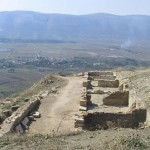The Celtic Church: A Defence of Kinds February 10, 2013
Author: Beach Combing | in : MedievalThe ‘Celtic Church’ is the phrase commonly used to describe the version of Christianity that triumphed in much of Britain and Ireland throughout the early Middle Ages, say 400-800. Historians of the calibre of Patrick Wormald (RIP), Wendy Davies and Kathleen Hughes (RIP) have argued or even railed against it. What follows is a half-hearted […]
White Horses, Sex and Sovereignty December 12, 2011
Author: Beach Combing | in : Ancient, Medieval
Inspired by Southern Man’s comment on yesterday’s post Beach thought he would today quote from some of the passages relating to Irish sovereignty. There was in pre-Norman Ireland the idea that the land is a woman, Sovereignty, who must be courted and seduced by the successful king. Take, for example, this rather tame passage relating […]
A Celtic Tribe in Kazakhstan? July 29, 2011
Author: Beach Combing | in : Ancient
When Beach was still a green blogger – before he had learnt about spiders, search engine optimization and RSI feeds – he spat out a little post about a group of Celtic hoodlums who, as mercenaries, travelled around the Mediterranean causing havoc everywhere they went. Beach sold this as a Wrong Place post: an example […]
Sink or Swim: Infanticide and ‘Baptism’ on the Ancient Rhine April 25, 2011
Author: Beach Combing | in : Ancient
Portentous day in the Beachcombing household as Tiny Miss B, the new arrival, was baptised with a select group of friends and in-laws looking on. Unlike Little Miss B – a chip off the Beachcombing block, who screamed her way through her welcoming into the church – the younger Beachcombing, who takes, instead, after her […]
Celts in Ancient Sicily June 11, 2010
Author: Beach Combing | in : Ancient
Beachcombing has luxuriated for too long in the modern world. Indeed the last time he visited antiquity was in the company of some Indian merchants a long week ago. So he rushes back today to the clean, glistening marble of the ancients. The following passage comes from G.T. Griffith’s The Mercenaries of the Hellenistic World (London […]


